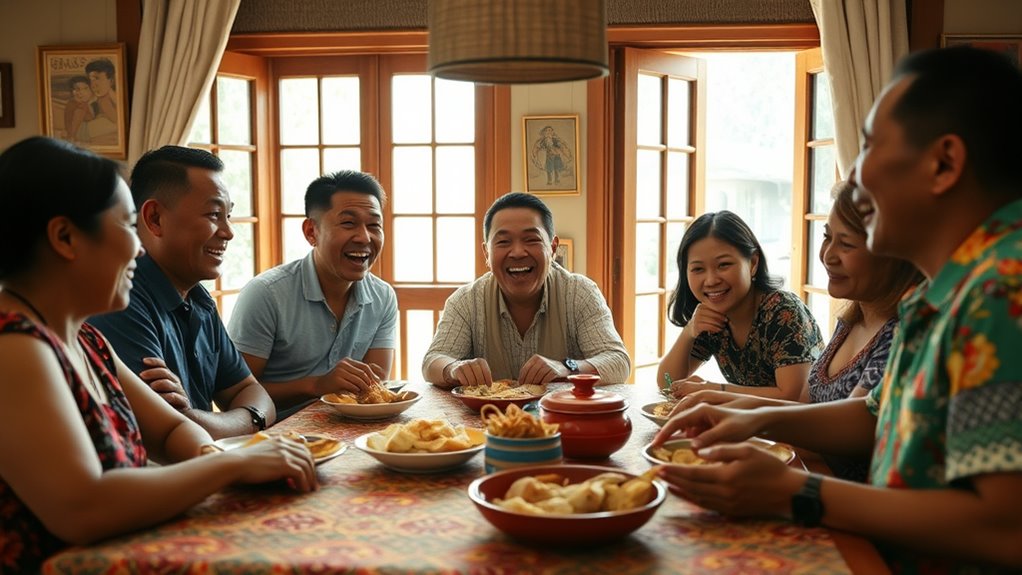In Filipino culture, jokes are a key way you connect with others, breaking the ice and easing tensions with humor rooted in shared experiences. You’ll notice humor often involves wordplay, teasing close friends, and reflecting everyday life, which strengthens bonds and fosters a warm community. Laughter transcends social boundaries, promoting positivity and understanding. If you keep going, you’ll discover more about how humor shapes communication and keeps Filipino culture lively and united.
Key Takeaways
- Jokes serve as a social glue, fostering warmth and connection in Filipino daily interactions.
- Humor reflects shared cultural experiences, strengthening community bonds and cultural identity.
- Wordplay and language nuances make jokes engaging, showcasing wit and intelligence.
- Light teasing and self-deprecating humor promote openness and ease tension.
- Laughter through jokes helps Filipinos maintain positivity amid life’s challenges.

Jokes play an essential role in Filipino communication, serving as a lively and relatable way to connect with others. In the Philippines, humor isn’t just a form of entertainment—it’s a crucial part of everyday interactions. You’ll notice that Filipinos often use jokes to break the ice, ease tension, or simply share a moment of joy. Cultural humor, rooted in shared experiences and traditions, makes these jokes resonate deeply. Whether it’s teasing a close friend or lightheartedly ribbing a family member, humor helps strengthen bonds and foster a sense of community. You’ll see that Filipino jokes often draw from everyday life, highlighting common struggles, quirks, or local customs, making the humor feel personal and inclusive.
Linguistic wordplay is a hallmark of Filipino jokes. The Filipino language, with its rich mix of Tagalog, English, and regional dialects, lends itself beautifully to clever puns and double meanings. You might catch someone making a joke that plays on the sound of words, turning a simple phrase into a humorous punchline. For example, wordplay involving Tagalog words like “bili” (buy) and “bawi” (recoup) can lead to witty exchanges that keep conversations lively. This linguistic creativity isn’t just for laughs; it’s a way to showcase wit and intelligence, making humor more engaging and memorable. When you participate in such jokes, you’re not only sharing a laugh but also connecting on a deeper cultural level, appreciating the language’s nuances and playful spirit.
Filipino humor often involves self-deprecation and light teasing, which are seen as signs of humility and warmth. You might find yourself joking about your own flaws or poking fun at everyday frustrations, like traffic or household chores. These jokes create a relaxed atmosphere, inviting others to join in without feeling judged. It’s a way to cope with challenges while maintaining a positive outlook. The humor is inclusive, and everyone feels invited to share their own funny stories or punchlines, making conversations more vibrant. Through these jokes, Filipinos demonstrate that laughter is a universal language—one that crosses socioeconomic and cultural boundaries easily.
Frequently Asked Questions
How Do Jokes Influence Filipino Social Hierarchy?
Jokes play a significant role in shaping Filipino social hierarchy by promoting respectful humor that fosters social bonding. When you share jokes thoughtfully, you show respect while creating connections across different social levels. It helps break down barriers, making interactions more relaxed and friendly. By using humor wisely, you can reinforce or challenge social hierarchies, encouraging mutual understanding and strengthening relationships within the community.
Are There Specific Topics Considered Taboo for Jokes?
Think of humor as a delicate dance—some topics are like stepping on toes. You should be mindful of cultural sensitivity and religious boundaries, as jokes about these can offend. Certain subjects, like death or sacred beliefs, are considered taboo and best avoided in humor. Respecting these limits helps you maintain harmony and avoid misunderstandings, ensuring your jokes bring smiles rather than discomfort.
How Do Jokes Vary Across Different Filipino Regions?
You’ll find that jokes change across Filipino regions because regional dialects influence humor and expression. Cultural nuances shape what’s funny and how jokes are delivered, making humor unique to each area. In some regions, humor might be more playful, while in others, it’s more subtle. Understanding these differences helps you appreciate the diversity in Filipino humor and connect better with people from different parts of the Philippines.
What Role Do Humor and Jokes Play in Conflict Resolution?
Oh, how you’d think conflict resolution is all serious business, but humor reveals its true power. You use jokes to acknowledge cultural nuances, easing tension and fostering understanding. When emotions run high, a well-timed laugh provides emotional relief, breaking down barriers. In Filipino culture, humor isn’t just entertainment; it’s a strategic tool that softens conflicts, encourages forgiveness, and reminds everyone that sometimes, a good joke is the best bridge to reconciliation.
How Has Modern Media Changed Joke-Telling in the Philippines?
Modern media has transformed joke-telling in the Philippines by making humor more accessible and diverse. You now encounter digital memes and influencer humor daily, which spread quickly across social media platforms. These formats allow you to share jokes instantly, often trending nationwide. This shift makes Filipinos more connected through humor, blending traditional jokes with contemporary digital culture, and changing how you experience and create humor in everyday life.
Conclusion
You never realize how a simple joke can lighten your day or bridge gaps in conversation until you see it happen. It’s almost like the universe aligns, reminding you that laughter is a universal language, especially in Filipino culture. When you crack a joke, you’re not just sharing humor—you’re connecting, easing tension, and creating memories. So next time life feels heavy, remember: a well-timed joke might just be what you need to turn things around.









